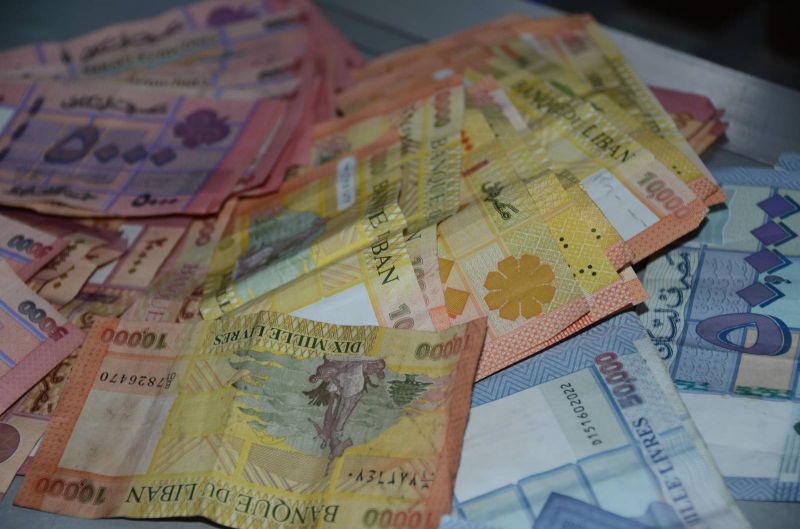
Various Lebanese Lira notes. (Credit: Sandrine Frem/Pao Ibrahim).
- The World Bank released a revealing report on Thursday indicating that Lebanon's poverty rate had surged to 44 percent of the overall population in 2022 (including the estimated 1.5 million Syrian migrants and refugees), and 33 percent of the Lebanese population, meaning one in three Lebanese citizens is now living in poverty. The figure represents a threefold increase compared to 10 years ago.
Coincidentally, the report was published within hours of an International Monetary Fund (IMF) delegation's visit to Beirut. The IMF highlighted that "the absence of necessary economic reforms" has driven unemployment and poverty to "exceptionally high" levels amid a five-year socio-economic crisis.
- After hitting the double-digits in March for the first time since June 2020, the annual growth of the Consumer Price Index (CPI) continued to slow down in April for a second consecutive month.
The CPI, a measure of inflation, recorded an annual growth rate of 59.67 percent (compared to 70.36 percent in the previous month). In comparison, the monthly change stood at 1.74 percent (a slight increase from the 1.72 percent recorded in March), according to the latest data from the Central Administration of Statistics published on Tuesday.
- Lebanon’s balance of payment (BOP) for 2023 — the amount of money flowing into the country versus the amount flowing out – recorded a deficit of around $643 million compared to a deficit of $2.64 billion in 2022, according to BlomInvest’s latest analysis. This represents a drop of 75.6 percent between the two years.
“Lebanon is moving in the right direction, but we are still far from having a balanced BOP,” explained Ali Bolbol, Head of the Economic Research Department at BlomInvest. “To have a balance of payment in equilibrium means that our trade performance is good and we’d be exporting more, which increases domestic production and creates more jobs — but this is still not the case.”
- An International Monetary Fund (IMF) team said, after visiting Beirut, that Lebanon has made "some progress in lowering inflation and stabilizing the exchange rate" but that "these reforms are insufficient for recovery," according to a press release published by the international institution on Thursday.
An IMF team, headed by Ernesto Ramirez Rigo, visited Beirut from Monday to Thursday to discuss "recent economic developments and progress on key reforms.”
- For the second year running, remittances to Lebanon are rising. According to figures from the Banque du Liban (BDL) relayed by Byblos Bank's weekly newsletter Lebanon this week, these remittances totaled $6.7 billion in 2023, up 4.1 percent, compared to $6.44 billion received in 2022.
This amount is still higher than the World Bank's forecast for 2023, equivalent to nearly $6.4 billion, and represents the 12th highest level since 2002. It is also higher than the 2002-2023 average of $6.42 billion.
According to our calculations, Lebanon will have received 29 percent of its 2023 GDP in remittances from abroad. This indicator accounts for calculation based on the latest official World Bank figure for 2021 (GDP of $23.59 billion in 2023, compared with $23.13 billion in 2021).
By comparison, this ratio was equivalent to 14 percent in 2019, 27 percent in 2020, 28.3 percent in 2021 and 37.8 percent in 2022. At that time, Lebanon ranked first among Middle Eastern and North African countries in remittances/GDP ratio, and second worldwide, just behind the Tonga archipelago.
At the same time, outflows from Lebanon to other countries totaled $1.78 billion in 2023, up by 2.2 percent compared to 2022 ($1.74 billion). This amount represents the second lowest level recorded since 2002.
- Prices of gasoline, diesel and heating oil have continued to drop this week, as seen in the latest numbers published by the Energy and Water Ministry. However, the price of a domestic gas cylinder remains unchanged.
Here are the new prices:

